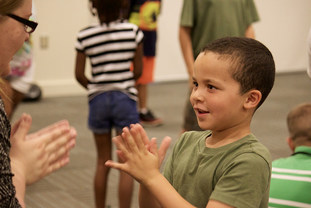COMMUNICATION IS THE KEY
PLAYDon’t underestimate the value of play.
Play and learning go hand in hand. Through play children learn and develop: cognitive skills physical abilities new vocabulary social skills pre-literacy and literacy skills Tips for Supporting Your Child to Play More: 1. Turn off the television, take away the iPads and turn off your own phone so you can create an environment rich for play and communication opportunity. 2. Make sure they have as much time to play with you and others as possible during the day to promote cognitive, language, physical, social skills, and emotional development. 3. Practicing using communication skills in play and everyday life is an essential key to supporting speech and language development. 4. Consider purchasing good quality educational toys that will last and will support your child to use their imaginative play skills. Puzzles, little people figurines, a play/dolls house, garage or fire station and vehicles are a great place to start. There are so many fabulous toys and books available to support learning and communication through play. Have a look at our Speech Smart Therapy Online Shop for some great suggestions. |
CHATTalking is a big part of our lives!
Communication really is the 'key' to so much of what we experience and learn in life. Think of a moment when you've experienced trying to explain something to someone and they've totally misunderstood you or not understood at all. Did you feel annoyed, frustrated, maybe angry that they just didn't understand what you meant? For children with communication difficulties these breakdowns in communication happen everyday and constantly throughout the day. It's no wonder many children with communication delays and difficulties are often reported to have behaviour difficulties as well. Tips for supporting a child with communication difficulties: 1. Early identification and intervention is essential to support children to overcome their communication difficulties and to reduce the everyday frustration they experience due to frequent breakdowns in communication. 2. Seek advice from a Speech Pathologist as soon as concerns arise. There are many ways speech pathologists work with a child, their families and child care workers or teachers to help strengthen a child's communication skills. |
LEARNPlay is a child’s context for learning!
Books open up a world of new vocabulary, language and inspire imagination and learning.
Tips for Learning:
1. Repetition and practice are the key to learning. 2. Read to you child everyday. Build in a specific time you read to them each day. If your child struggles to look at books with you start with interactive books that have flaps and sensory pages. You don't have to read a book word for word if your child starts to lose interest or turn out. Sometimes they will learn lots from just looking at the pictures with you and talking about what you can see. 3. Join your local library and go on a regular basis so your child gets to experience lots of different books. Local libraries often have lots of great activities for kids. |
'Play Chat Learn' Activities Your Kids Will Love:
Read together daily.
Bubbles
Playdough
Teddy bears or dolls picnic.
Dolls house and little people play with toy furniture.
Toy train and vehicles play.
Favourite toys hide n' seek.
Bath time play
Puzzles
Craft: paint, cut, paste, build and/or colour in activities.
Bubbles
Playdough
Teddy bears or dolls picnic.
Dolls house and little people play with toy furniture.
Toy train and vehicles play.
Favourite toys hide n' seek.
Bath time play
Puzzles
Craft: paint, cut, paste, build and/or colour in activities.
‘Act Early’ and talk to a specialist if you have concerns about your child’s communication, play and/or general development and learning. Speech Pathologists specialise in supporting children who have difficulties in their communication development. The earlier the support is provided, the more likely it is for the child to be able to overcome the difficulties they're having. If you're concerned about another area of your child's development talk to your child's GP or child health nurse. Have a look at a 'developmental checklist'. This may help you determine if you're child is reaching their expected developmental milestones. It may be a good idea to take the developmental checklist with you when you visit your GP or child health nurse to talk about how your child's development is progressing and together determine if you need to seek extra support to help your child in their development. I have listed several developmental checklists you can access via my 'resources and links' section on my website.
|
Speech is important for playing.
|
Speech is important for learning to read.
|
Speech is important for giving an opinion.
|
Speech is important for talking about what happened.
|
Speech is important for talking with friends.
|




